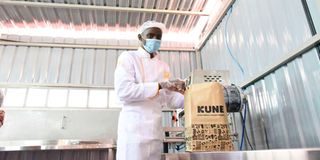What can we learn from KUNE’s sudden folding?

A Kune Food staffer packs food at the facility on March 3, 2022.
Last week we looked the suitability of business plan for start-up businesses. Specially we said that “a business plan is a particularly useful tool in business management especially for businesses that have picked traction and have developed significant demand for their products and services.”
Following the unexpected folding the food start-up KUNE, within the intervening week, I feel obligated to expand this discussion especially as it concerns start-ups.
I have always maintained that a start-up is business experiment, which is still finding its place in the market – continually defining its market segments, products, delivery channels, appropriate options for acquiring, growing, and maintaining customers as well as infrastructure on an ongoing basis. It is in fact more highly likely to fail than to succeed especially when started by people who do not transferable skills essential all business situations.
In my view KUNE suffered from this primary problem before coupling it with over-investment in the capital investments (read as the physical infrastructure capacity) long before building the demand volumes it needed to support. These are some of the key issues in business where a business plan would provide guidance.
Avoid suicidal mistakes
It is the owners of the business that are a start-up. They are learning while pursuing a hypothesis concurrently. It is not the food business which is new but the rather the business model which has been designed to try something new, perhaps also exciting. They must learn fast and avoid suicidal mistakes.
The physical infrastructure of a business and its subsequent expansion should be guided by sales performance. Minimal investment would be needed to start off. Expansion both in working capital and capital investment are informed by real growth whether the money is yours or borrowed.
A business plan would provide the line of sight for growth – whether the trends are within the prior assumptions, exceeding or falling below par. For a start-up, the level of accuracy may be distorted but still realistic for decisions. KUNE food start-up seem to have been in the wrong side of these facts from the date they opened the door to customers.
KUNE people were learning the Kenya market fast food landscape. It is quite different from what you would imagine based on what you see with your eyes only. There are solid reasons behind any trend and needs to be understood by listening to the real people in the marketplace and managed. The traits of individual behind the business enable them to succeed in this mountain climb.
Develop a business plan
Like I said last week, when you develop a business plan for such an experiment, you will be equivalent to a researcher working on a hypothesis, and not a businessperson who already understands the demand patterns for their product and how things will pan out when market forces change.
KUNE developed a business concept from a vague idea that was to provide affordable quality food while at the same disrupting established players. I am sure they had a well-crafted business plan for this game even though I cannot comment on how well it was executed in the Nairobi business prototype.
You will notice that the existing players in the distribution of ready meals were lowering the cost of doing business and increasing excitement. KUNE as a competition introduced its own distribution system that increased its cost base. That would mean they needed to sell more units to break even. They also needed to have a mechanism for maintain the cost of food – their main ingredient.
Although these items should have featured in the business plan, it should be noted that higher fixed cost base and rising food prices ripped off their profits and set the pace for business death.




